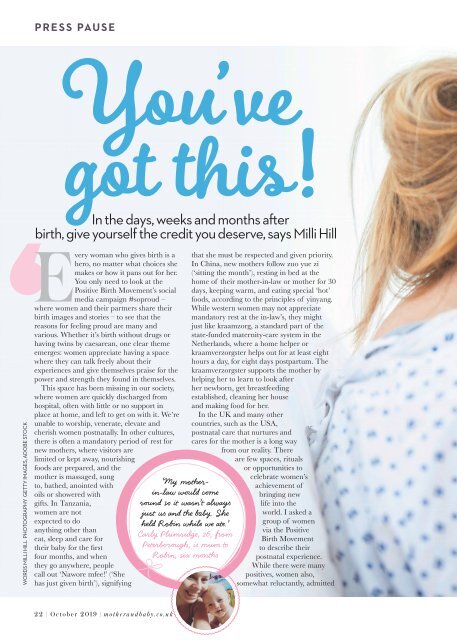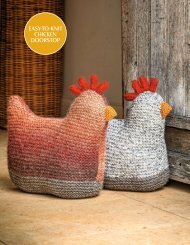Create successful ePaper yourself
Turn your PDF publications into a flip-book with our unique Google optimized e-Paper software.
press pause<br />
You’ve<br />
got this!<br />
In the days, weeks and months after<br />
birth, give yourself the credit you deserve, says Milli Hill<br />
Words Milli Hill Photography getty images, adobe stock<br />
Every woman who gives birth is a<br />
hero, no matter what choices she<br />
makes or how it pans out for her.<br />
You only need to look at the<br />
Positive Birth Movement’s social<br />
media campaign #soproud –<br />
where women and their partners share their<br />
birth images and stories – to see that the<br />
reasons for feeling proud are many and<br />
various. Whether it’s birth without drugs or<br />
having twins by caesarean, one clear theme<br />
emerges: women appreciate having a space<br />
where they can talk freely about their<br />
experiences and give themselves praise for the<br />
power and strength they found in themselves.<br />
This space has been missing in our society,<br />
where women are quickly discharged from<br />
hospital, often with little or no support in<br />
place at home, and left to get on with it. We’re<br />
unable to worship, venerate, elevate and<br />
cherish women postnatally. In other cultures,<br />
there is often a mandatory period of rest for<br />
new mothers, where visitors are<br />
limited or kept away, nourishing<br />
foods are prepared, and the<br />
mother is massaged, sung<br />
to, bathed, anointed with<br />
oils or showered with<br />
gifts. In Tanzania,<br />
women are not<br />
expected to do<br />
anything other than<br />
eat, sleep and care for<br />
their baby for the first<br />
four months, and when<br />
they go anywhere, people<br />
call out ‘Nawore mfee!’ (‘She<br />
has just given birth’), signifying<br />
‘My motherin-law<br />
would come<br />
round so it wasn’t always<br />
just us and the baby. She<br />
held Robin while we ate.’<br />
Carly Plumridge, 26, from<br />
Peterborough, is mum to<br />
Robin, six months<br />
that she must be respected and given priority.<br />
In China, new mothers follow zuo yue zi<br />
(‘sitting the month’), resting in bed at the<br />
home of their mother-in-law or mother for 30<br />
days, keeping warm, and eating special ‘hot’<br />
foods, according to the principles of yinyang.<br />
While western women may not appreciate<br />
mandatory rest at the in-law’s, they might<br />
just like kraamzorg, a standard part of the<br />
state-funded maternity-care system in the<br />
Netherlands, where a home helper or<br />
kraamverzorgster helps out for at least eight<br />
hours a day, for eight days postpartum. The<br />
kraamverzorgster supports the mother by<br />
helping her to learn to look after<br />
her newborn, get breastfeeding<br />
established, cleaning her house<br />
and making food for her.<br />
In the UK and many other<br />
countries, such as the USA,<br />
postnatal care that nurtures and<br />
cares for the mother is a long way<br />
from our reality. There<br />
are few spaces, rituals<br />
or opportunities to<br />
celebrate women’s<br />
achievement of<br />
bringing new<br />
life into the<br />
world. I asked a<br />
group of women<br />
via the Positive<br />
Birth Movement<br />
to describe their<br />
postnatal experience.<br />
While there were many<br />
positives, women also,<br />
somewhat reluctantly, admitted<br />
22 | <strong>Oct</strong>ober 20<strong>19</strong> | motherandbaby.co.uk

















